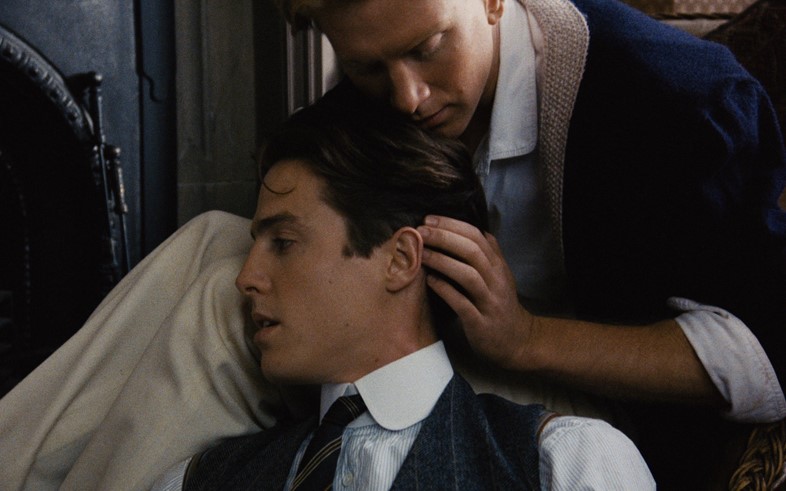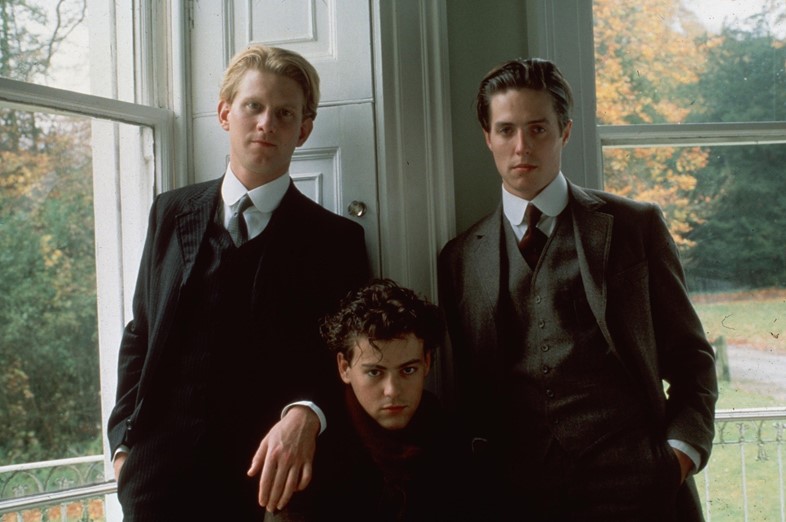Re-released by the BFI this month, Merchant Ivory’s 1987 film is a story of achingly obsessive first love and coming of age as a gay man in a restrictive society – here, Claire Marie Healy explains why it’s a must-see
In an early scene of Maurice, Merchant Ivory’s lush 1987 adaptation of EM Forster’s novel of the same name, we see the title character sitting with his shoulders slightly slumped, in the way you only do when you’re in a room full of people you feel entirely alienated from. Surrounded by preening students in his first term at Cambridge, he joins the lofty debate with a simple statement: “What you do is more important than what you say.” It’s this central tension between doing and saying that plays out in devastating fashion throughout this film: a story of gay love in a society where homosexuality is a prisonable offence. For Maurice (James Wilby), love speaks in actions, for his first love Clive (Hugh Grant), simply saying how you feel should be enough. In the space in-between Clive’s words and Maurice’s deeds, there are only looks, and looks returned; most of this story happens in hesitant glances, desperate glances. Looks flicker throughout Maurice like sparks from a fire, because to hold on to them too long is too dangerous for any gay young man in England in 1909.
James Ivory’s film will reach new audiences this month, re-released by the BFI with the clear aim of capturing the imagination of those who have missed immersing themselves in the blissed-out, blue-skied world of Luca Guadagnino’s Call me By Your Name. But while similarities abound between the projects, by the time the cinema seats flip down on Maurice, you’ll come to appreciate the film for its own, equally peachy merits.

Maurice is a story of gay love, but, like Call me By Your Name, it’s also a story of achingly obsessive first love. Written by EM Forster in 1914, it wasn’t published until 1971 due to its contentious subject: coming of age as a gay man in a restrictive society. Just 16 years since readers first encountered the novel, Merchant Ivory adapted it for the big screen. Founded by producer Ismail Merchant and director James Ivory, by 1987, the film company had just achieved huge critical acclaim for another Forster adaptation, A Room with A View. Even in the context of their exquisite period dramas, Merchant Ivory's decision to adapt Forster's most controversial novel presented something of a curveball for audiences – but unbeknownst to the press, the story of repressed love was likely close to their hearts, as the pair remained in a secret romantic relationship until Merchant's death in 2005.
The film follows Maurice from his school days to his meeting and friendship with Clive at college: a friendship which eventually leads to a confession of love from the latter. Maurice, initially flustered – “I love you” is met with a very English “Don’t talk rubbish!” – eventually climbs through Clive’s window one summer’s night to say, simply, “I love you, too.” From there, the story progresses into their adult lives in London, lives which bring the pair down different paths: Clive towards conformity, marriage and public life, and Maurice to a struggle with his sexuality which will lead to an encounter and secret affair with a servant. Beyond the workings of plot, it’s the breathtaking environments, and how the actors rhythmically hold your attention within them, that keeps you entranced.

The similarities between Maurice and Call me By Your Name are so many that the films seem to be having a conversation across the decades. There’s playful wrestling on the floor, and quiet, chaste talks in long grass; childhood rooms that are a few walls away from where the adults sleep, and windows to clamber through on muggy summer nights. There’s references to Ancient Greece and wanderings in its modern-day ruins: the “unspeakable” vices and statues of the culture are always hovering in the background. And, just as Elio does at the end of Call Me By Your Name, we even see a lovelorn Maurice crying into a fire – and half expect the credits to start rolling.
It’s far from lazy journalism to call out Maurice’s similarities to Luca Guadagnino’s glorious sun glare of a feature. With the fan focus on Timothée Chalamet’s breakout performance, you might have missed the fact that James Ivory himself wrote the script for Call me By Your Name, personally adapting it for screen from André Aciman’s sensual book. When the director collected his Oscar for Best Adapted Screenplay in March of this year, he gave a sweet shout-out to his former collaborator Merchant. Picking up the statuette, a now 89-year-old Ivory described how it was his late, beloved partner who “led (him) to this award.” As modern life becomes more chaotic than ever, it seems only right that Merchant Ivory’s odes to another time are newly appreciated for their space, their nuance, and their emotions that play out in subtle shifts and temperature adjustments – until the inevitable cracks start to show. Ivory’s screenplay in Call me By Your Name defined a generation’s wanderlust and made us all believe in romance again: it’s a capacity to tell emotional truths about humans in love, no matter the era, that is visible in Maurice, too.
Watching Maurice now, the film does have its limitations, and inevitably shows its age: in the final third, the passionate relationship between Maurice and his lover, Alec Scudder, seems sadly all-too-unbelievable compared to the initial scenes with Clive. Regardless, the film is worthy of its return to the silver screen, and more than worth the re-visit. For one, Grant’s performance is a kind of prequel to his latest persona as notorious politician Jeremy Thorpe in A Very English Scandal, who was famously put on trial for conspiring to murder his lover, Norman Scott (played by Ben Whishaw in the BBC drama). The film is also a reminder of the intergenerational forebears to the LGBTQ fight on its own terms: the relationship between Maurice and Clive hits its first roadblock when a fellow student at Cambridge is jailed after soliciting sex from a soldier. The courtroom scene, in which their peer is pronounced guilty of “homosexuality”, brings the reality – and risk – of their romance devastatingly to the fore.
Most of all, the first hour of the film, in which the relationship between Maurice and Clive is sparked and explored in Cambridge, the countryside, and London, are quietly enthralling. Stolen glances and kisses in the grass, Greek lectures and piano; suddenly, last summer seems closer again.
Maurice is in cinemas from July 27. Head here for more details











